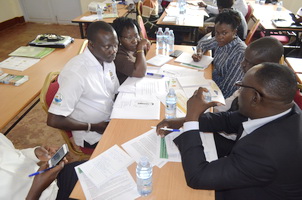
Journalists and Policymakers Demand for Simple Biotech Messages
July 3, 2019| |

"Science communication is challenging owing to the fact that most scientific technologies originate in the western world and thus African languages often do not have accurate translations of scientific terms," noted Dr. Anton Bua, a senior scientist at the National Crops Resources Research Institute (NaCRRI).
"The goal is to simplify how we communicate science and make sure that no matter the language spoken, the audience received a similar message," said Dr. Barbara Zawedde—the UBIC Coordinator during a recent launch of this initiative at one of NARO's Zonal Agricultural Research and Development Institute in Uganda. Participants took part in identifying and simplifying some of the most commonly used terminologies by Ugandan scientists, and developing simplified messages for common socio-economic and ethical concerns associated with biotech crops.
Ambiguities in languages/semantics often distort the science messages making this effort extremely pertinent in an era of increasing and deliberate misinformation. Once finalized, the ‘dictionary' will be widely disseminated to biotech communicators and champions to facilitate informed dialogue on modern agricultural biosciences and biotechnology.
For more information, please contact ubic.nacrri@gmail.com.
| |
Biotech Updates is a weekly newsletter of ISAAA, a not-for-profit organization. It is distributed for free to over 22,000 subscribers worldwide to inform them about the key developments in biosciences, especially in biotechnology. Your support will help us in our mission to feed the world with knowledge. You can help by donating as little as $10.
-
See more articles:
-
News from Around the World
- Scientists Propose for Global Surveillance System for Crop Diseases
- Ugandan Legislators Call for Fast Tracking of Commercialization of Bt Cotton in Kenya
- Journalists and Policymakers Demand for Simple Biotech Messages
- Scientists Discover Plants' Oil-Production Accelerator Also Activates the Brakes
- USDA Reports Advancement of Biotechnology Adoption in Bolivia
- Biotech Community Convenes to Consolidate Advocacy Efforts in the Philippines
- Plants from Darwin's Collection Reveal Ancestry of European Potato
- EuropaBio's Head Calls for Change in EU's Approval System for GMOs and Gene-edited Products
-
Research Highlights
- Experts Evaluate the Potential Effect of Gene Flow from IR/HT Maize to Mexican Landraces
- Gene from Bitter Melon Protects Rice from Sheath Blight Disease
-
Beyond Crop Biotech
- Newly Hatched Genetically Engineered Salmon Showcased in Albany
-
From the BICs
- Project SAFFAL Empowers Smallholder Farmers to Cope with Fall Armyworm
-
Resources
- Science and She: Dr. Ma. Monina Cecilia Villena
-
Plant
- Rise of the First Gene-edited Soybean Welcomes New CRISPR Foods
- CRISPR-Cas9-mediated Mutagenesis of GmFT2a and GmFT5a Improves Adaptability of Soybean
-
Read the latest: - Biotech Updates (February 4, 2026)
- Gene Editing Supplement (January 28, 2026)
- Gene Drive Supplement (February 22, 2023)
-
Subscribe to BU: - Share
- Tweet
